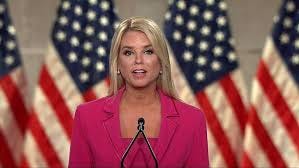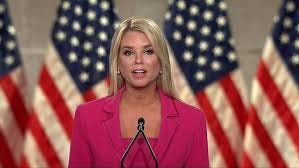Trump's Second Choice
Within hours of Donald Trump's first choice for Attorney General withdrawing, the President-elect chose Pam Bondia as his Attorney General nominee. What might Bondi Justice look like?
Justice Briefs is a weekly newsletter devoted to federal criminal prosecution. The federal government’s evolution over the last 230 years has given federal prosecutors significant discretion. Few realize it exists and even fewer know how it is used. Justice Briefs aims to make federal prosecutions and prosecutors more accessible to the general public. Please help me in this endeavor by subscribing and sharing with others.
Justice in Brief
In the District of Massachusetts, a man entered a guilty plea to nine counts of breeding pitbulls with the intent to use them in dog fights. The conduct violated the federal Animal Welfare Act.
In the District of Arizona, a man was sentenced for making threats to kill FBI agents and local law enforcement officials.
In the Northern District of Texas, a man entered a guilty plea to shipping products to a sanctioned Chinese company in violation of the Export Control Act. Over the course of several years, his company sent more than 1000 items to the designated company without the proper license.
Bondi Justice
It did not take President-Elect Donald Trump long to pivot from Matt Gaetz as United States Attorney General to Pam Bondi. Her nomination is more consistent with what the only other two-time President, Grover Cleveland, did with his second term. Both have selected competent and respected attorneys that did not have significant national reputations prior to their selection. Unlike Cleveland’s choice, however, Bondi has both prosecutorial experience and an ideological agenda.
Pam Bondi is most known as the first female Attorney General for the state of Florida. As a career assistant state’s attorney in Florida, she won election as Florida’s Attorney General in 2010. She benefitted from an endorsement by Sarah Palin, then a leading Republican figure, and from a strong media-oriented campaign. During her time as Attorney General, Bondi focused her law enforcement efforts on drug abuse. She also led challenges to President Obama’s Affordable Care Act. Her first national recognition came during the 2016 Republican National Convention when she led the delegates in a chant to arrest Hillary Clinton.
While in office, Bondi developed a strong relationship with Donald Trump. In 2013, he donated to her re-election campaign. Three years later, she endorsed Trump in the Florida presidential primary, stating that they had been friends for some time. This led to her appearance at the Republican National Convention. At the same time, Bondi declined to join a multi-state lawsuit against Trump University, a short-lived real estate and entrepreneurship venture that closed amidst student complaints.
When Bondi left office in 2019, she joined Ballard Partners, a global lobbying firm. Shortly afterward, then-President Donald Trump faced his first impeachment proccedings. During the proceedings, she presented the argument that there was a legitimate investigation ongoing into Hunter Biden’s efforts to remove the Ukrainian prosecutor allegedly investigating Biden’s business dealings in Ukraine. She was also connected with Lev Parnas, one of the people convicted of campaign finance violations stemming from his donations to President Donald Trump’s 2020 campaign. On the heels of the 2020 campaign, Bondi was also a vocal supporter of President Trump’s efforts to overturn the 2020 election result, claiming widespread fraud.
In 2024, Bondi led the legal branch of the American First Policy Institute. In its own words, the “AFPI exists to advance policies that put the American people first. Our guiding principles are liberty, free enterprise, national greatness, American military superiority, foreign-policy engagement in the American interest, and the primacy of American workers, families, and communities in all we do.” As an organization, the group created its own agenda, including several touching upon federal prosecutorial priorities. Pillar 5 promises to secure the border, end human trafficking, and defeat the drug cartels. Pillar 9 addresses the provision of “safe and secure” communities. Pillar 10 deals with fighting government corruption. Within each pillar are chapters highlighting particular aims. For instance, in Pillar 9, there is a chapter on restoring the rule of law. One step to promote that idea is to “prioritize aggressive enforcement of existing criminal laws and strict interpretation of those laws.” This indicates that the federal government should pursue many cases but that those pursued will not look to use old laws in new ways.
Bondi’s primary work with the America First Policy Institute is in the area of litigation. Along with former interim Attorney General Matthew Whitaker, Bondi and two others submitted an Amicus brief on behalf of former President Trump arguing that the appointment of Jack Smith as special counsel was unconstitutional. She also worked on a challenge to Arizona’s election policy manual.
With this background, how will the Justice Department evolve under her leadership? This can be answered by looking at two other questions. First, what will the Department’s priorities be? Second, will she enable President Trump to prosecute his political enemies?
The Department’s priorities will likely shift slightly but not in any way that is noticeable. There will likely be fewer fraud and corruption prosecutions as they often require broad statutory interpretations. Instead, prosecutorial resources will be used to deal with immigration and drug offenses. These are reactive prosecutions that require people to process the cases but do not involve significant legal questions. The manner of enforcement may generate legal and political controversy but the law in these areas is clear. There is also a high likelihood of more resources devoted to human trafficking. This was a key component of the America First Policy Institute’s agenda. Proseuting these cases ties with immigration and drugs as human trafficking involves moving people across the national border and people and drugs often move along the same smuggling routes.
While the priorities are clear, whether Bondi will use the Department to prosecute President Trump’s enemies is less clear. Bondi’s rhetoric would indicate that she would do so. Her conduct as Florida’s Attorney General would also indicate that she would follow President Trump’s dictates. However, all of her conduct and her work as an attorney would indicate that she would not attack President Trump’s enemies through prosecution. Two key things support this. First, while she is a law and order proponent, there is no indication that she operates outside the law. She may pursue questionable legal theories, but she has legal support for them. Second, if she supports the American First Policy Institute’s agenda to interpret criminal law narrowly, she will not have grounds to prosecute President Trump’s enemies. None has committed explicit and obvious criminal conduct. Thus, any prosecution would require a broad reading of existing criminal laws.
At the same time, Bondi differs from the others President-elect Trump has appointed to the Justice Department thus far. Sauer, Blanche, Bove, and Clayton are not ideologues. They performed their jobs and represented the former President in his criminal cases. It does not follow that they believe Trump’s policies. Bondi, on the other hand, is ideological. This could create some conflict within the Department and lead to some of the President-elect’s more extreme policies to face internal opposition.
All of this raises the issues of prosecutorial independence. The coming weeks will look at different aspects of this issue in the context of current events.
I hope you enjoyed this issue and that it made you stop and think. I would love to hear any comments, questions, concerns, or criticisms that you have. Leave a comment or send a message! Also, if you enjoyed this or if it challenged your thinking, please subscribe and share with others!



